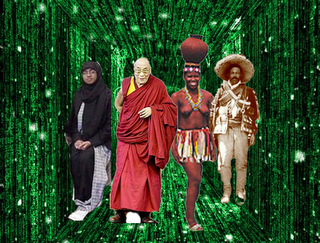 Frankly, Michael Crichton is not a writer one turns to for rich characterization & intricate plots. His characters are often two-dimensional (the sinister industrialist, the idealistic scientist, the bored wealthy heiress who sleeps with her tennis instructor). People read Crichton because his novels are interwoven with the latest science developments. Reading his novels is like picking up Technology Trends for Dummies.
Frankly, Michael Crichton is not a writer one turns to for rich characterization & intricate plots. His characters are often two-dimensional (the sinister industrialist, the idealistic scientist, the bored wealthy heiress who sleeps with her tennis instructor). People read Crichton because his novels are interwoven with the latest science developments. Reading his novels is like picking up Technology Trends for Dummies.His latest offering Next returns to the subject of biotechnology, a topic he hit gold with in what must be his bestselling books Jurassic Park and The Lost World. In Next, Crichton weaves various narratives about characters whose lifes are affected by the latest breakthroughs in biotechnology. A young woman confirms her suspicion about her parentage when she obtains cell tissue from the corpse of the man she was told was her father. Tourists to an ape sanctuary in Indonesia encounter an orangutuan who curses in Dutch and French. A cuckolded husband in a bitter divorce proceeding requires blood tests from his soon-to-be ex-wife to confirm that genetically she may be an unfit mother.
I'm still reading. I'll keep posting as I read further.















